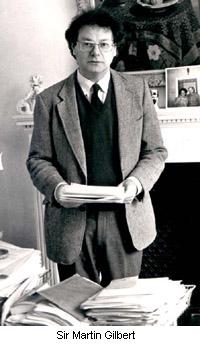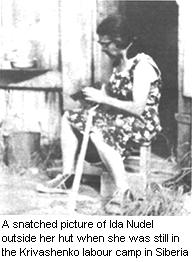
The death of Yuri Andropov brought to an end 15 dismal months in the story of Soviet Jewry.
Throughout the Andropov era, short though it was, Soviet Jews suffered in ways unknown for more than a decade. There were five blows: each of them severe.
First, the gates of emigration were slammed shut. From a peak of more than 50,000 in 1979, only 1,300 Jews were allowed to leave the Soviet Union in 1983, and only 88 in the last full month of Andropov's rule.
This closing of the gates was swift, savage, and demoralizing. Among the 1,300 allowed out were almost no refuseniks, no activists, and only a single Hebrew teacher. Andropov's message was clear: the era of emigration was at an end.
This message was not left to the Sovietologists and Kremlin-watchers to decipher. It was spelt out in April, 1983, in a telegram sent from Moscow by a leading Soviet journalist, direct to a Tel Aviv newspaper. "Whether you like it or not," the telegram read, "the saga of mass Jewish emigration from the Soviet Union has reached its end."
The telegram went on to state that it was being "openly said" in Moscow that "the last train has left."
Shortly after coming to power, Andropov gave clear expression to his attitude towards the Jewish cultural movement inside the Soviet Union: the private Hebrew classes, the Jewish religious seminars, and the ferment of Jewish national aspirations. He was opposed, he declared in December 1982, to the "festering sore" of false cultural demands by those whom he described as "bad elements."
"Of course," a leading refusenik commented to me in the Moscow suburb last March, "Andropov could let these 'bad elements', us, go. But it seems that he would prefer to crush us."
If closing of emigration crushed morale, trials and sentencing crushed individuals. This was the second blow. From the first month of Andropov's ascendancy, Dr Yosef Begun, Hebrew teacher and twice already a Prisoner-of-Zion, was held in prison, incommunicado.
For 11 months, the majority of Andropov's days of power, Begun was cut off from the outside world. Then, last October, he was sentenced to 13 years deprivation of liberty. Under Andropov's scheme, he will be 64 at the time of his release.
Begun was not the only Jew sentenced during Andropov's term of office. In January 1983 Simon Shnirman was sentenced to three years in a labour camp for the same so-called crime, draft evasion, for which he had already served two years. His daughter Yana was born a few days after he was sent to labour camp.
Shnirman wanted only to join his father and sister in Israel. Tragically, his father died a month ago. His mother had stayed behind in Russia in order to be with her son.
In June 1983 it was the turn of a Kharkov Jew, Dr Yuri Tarnopolsky, to be sentenced: he received three years. His "crime": to have helped organize a Jewish "university" in Kharkov, for the children of refuseniks who cannot obtain higher education. His friend, Alexander Paritzky, is already serving three years in labour camp for the same "crime".
As Dr Tarnopolsky was held in prison, awaiting trial, his nine-year-old daughter, Irene, appealed personally to Andropov. Her reason for writing direct to the great man was the success of the American schoolgirl, Samantha Smith, in getting a reply, and an invitation to visit the Soviet Union.
Irene Tarnopolsky's appeal went unanswered. So did hundreds of telegrams from the West, on behalf of Tarnopolsky, and of a Kiev Jew, Lev Elbert, also sentenced in June, to a year in labour camp. That same summer of Andropov's rule, all 100 United States senators appealed on behalf of Yosef Begun. The plea also went unanswered.
Only three weeks before Andropov's death, yet another Jew was imprisoned. Moshe Abramov, aged 28, was sentenced, in Samarkand, to three years in a labour camp. A religious Jew, his "crime" was to have inspired other young Jews in Samarkand to some rudiments of religious practice.
A third blow under Andropov was that not one single former Prisoner-of-Zion was allowed to leave the Soviet Union. In the past, release was followed quickly by emigration. Thirteen former prisoners are refused exist visas today.

Among those who, under Andropov, were not allowed to leave, despite having served their sentences, is Ida Nudel, who once brought comfort to so many prisoners. She is not allowed to join her sister in Israel. Nor is Vladimir Slepak allowed to join his wife's sister, also living in Israel. When Slepak, now in his 14th year of refusal, asked, a month ago, when he would be allowed out, he was told: "We will let you go when it suits us."
During Andropov's 15 months, it did not "suit" the Soviet authorities to let the former prisoners go. Nor did it "suit" them to give exit visas to the hundreds of Jews who are now in their tenth year or more of refusal. That was the fourth blow.
These men and women, the "long-term refuseniks," have never been sentenced on a criminal charge. In their years of refusal, they always hoped that there would be some unspoken limit to how long the authorities would say "no."
Andropov signaled clearly, to them and to us, that he paid no attention to length of refusal. In the whole of his 15 months, only a single refusenik of ten years and more was allowed to go to Israel. That, statistically, would trap most of the others for up to 500 years.
Among these long-term refuseniks is Alexander Lerner, who celebrated his 70th birthday on the day of the signing of the Madrid declaration on human rights last September, but who is still not allowed to join his daughter Sonia in Israel.
Nor is Lev Ovsischer, whose wife died a year ago, allowed out, after more than 12 years in refusal. He has been deprived of his officer's pension; and still this veteran of Stalingrad is kept, cruelly, in refusal.
Nor are Aba Taratuta and Yuly Kosharovsky allowed to leave, the first after ten, the second after twelve years in refusal. I feel a special link with these two men, and with their families: having met them, and enjoyed their company, I dedicated the sixth volume of the Churchill biography to them, "in friendship and in hope." That hope was that they and their families would be allowed to leave. It remains a hope.
Behind the arrests, trials, sentences, and growing number of refusals under Andropov has been an upsurge of anti-Zionist and antisemitic press articles and public cartoons. Jews who want to go to Israel are denounced as anti-Soviet, as agents of hostile forces, as tools of the American and Israeli intelligence forces. This was the fifth blow.
Since Andropov came to power, repeated newspaper stories attacked, often by name, the leaders and activists of the Jewish emigration movement. In provincial cities, like Odessa, the attacks were particularly severe.
In an odious cartoon in a Ukrainian mass-circulation magazine, a Sturmer-type Jew was seen helping the Israel army "rebuild" Auschwitz, Maidanek and Dachau in Southern Lebanon.
Andropov is now gone. The anti-Zionist committee set up last April remains. Anatoly Shcharansky is still in Chistopol prison, in his seventh year of incarceration. Begun is on his way to labour camp, his appeal rejected in the last week of Andropov's life. The former prisoners are still refused their exit visas. Those in refusal remain in refusal.
The scale of the problem grows. At the end of the Andropov era, more than ten thousand Jews are in refusal, ranging from the several hundred long-term refuseniks of ten years and more, to the equally large number of young people willing to embark upon the risks and disappointments of refusal. In addition, more than 360,000 Jews have asked for the formal invitation from Israel without which they cannot even begin to process their applications. This is a staggering figure. But it indicates how much even the Jews of Silence would like to speak, and to leave.
The pressures on all those who seek an exit visa are considerable. As I write these words, I have in front of me a letter, received this morning, from a former Prisoner-of-Zion. Six weeks ago, his daughter applied for an exit visa. On the same day of her application, she lost her job.
Andropov's successor will have many tasks. One of them is to redress the appalling record of the Andropov era in the matter of Jewish emigration.
Jews whom I met in Moscow called the pathetic exit figures of last year "the Andropov permissions." They could either be the new, harsh, permanent rule or a bridge to something better: to the opening of the gates anew.
“Jewish Chronicle”, March 2, 1984.